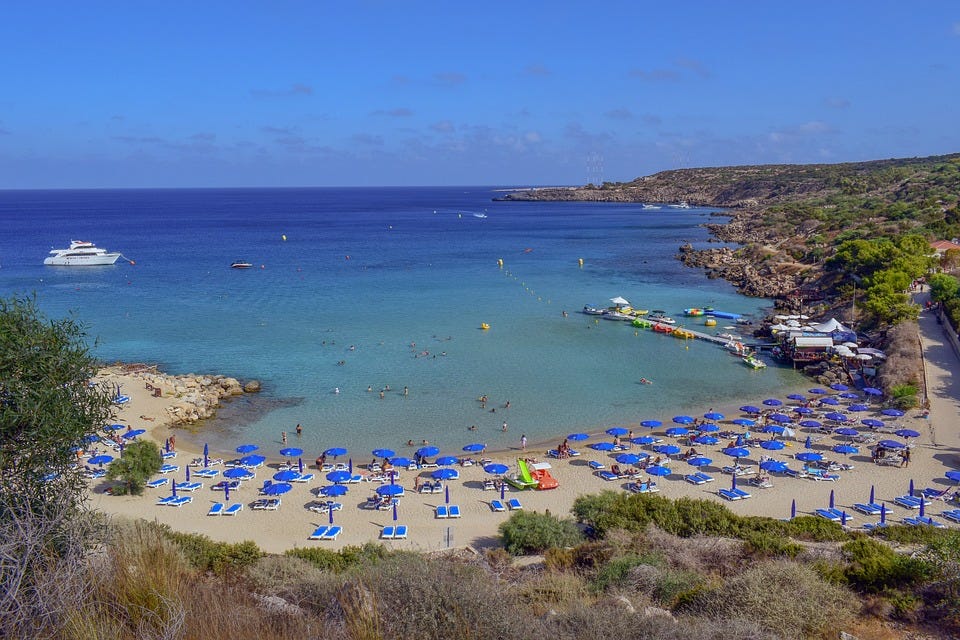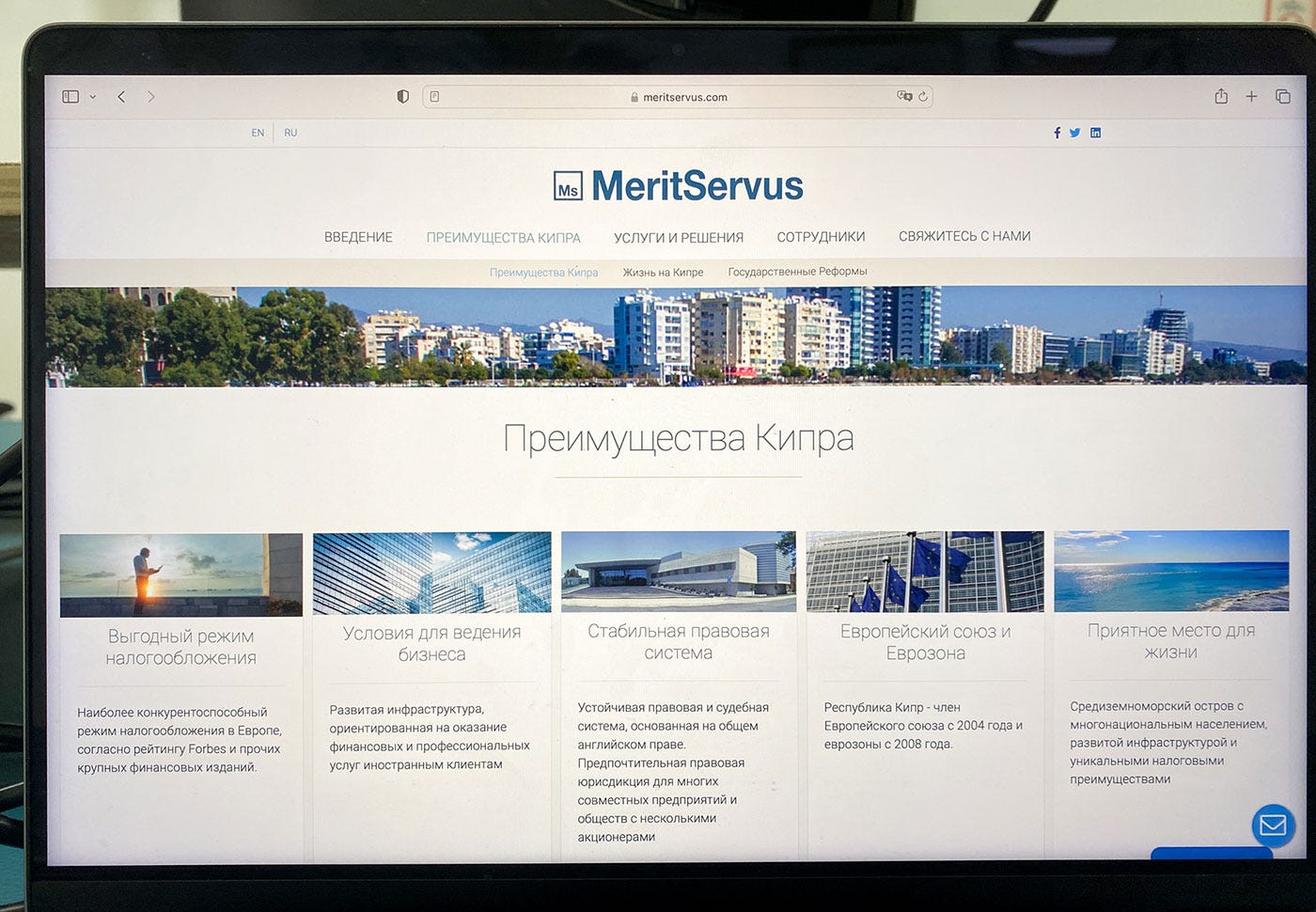Cyprus
Lovely Island Beloved by Illicit Russian Actors

A couple of months ago, I did an interview with the Organized Crime and Corruption Reporting Project (OCCRP)—a wonderful organization that investigates illicit finance and corruption, exposing malign actors worldwide who use the global financial system to conceal and move proceeds from crime and corruption. I’ve always had the highest respect for the organization, and I told them I was always happy to provide commentary for their articles.
This time, OCCRP was investigating a Cypriot corporate service provider, MeritServus, which helped sanctioned Russian oligarch Konstantin Malofeyev make millions of dollars in transfers even after he was designated for supporting the separatists in eastern Ukraine after Russia’s invasion of Crimea. I agreed to provide comments on the actions of the firm.
After several weeks of in-depth research, the article—along with a shorter piece in the UK’s Guardian—was published last week. This particular firm really exemplifies why sketchy Russian oligarchs love to create entities in Cyprus that will help them hide and move their assets unnoticed.
Malofeyev was sanctioned in 2014 by the EU and, a few months later, by the United States for funneling money and other support to the separatists in eastern Ukraine. At the time, Treasury also identified Malofeyev as one of the main sources of financing for Russians promoting separatism in Crimea. He “materially assisted, sponsored, or provided financial, material, or technological support for, or goods or services to or in support of the so-called Donetsk People’s Republic.”
What I told Tom Stocks, the terrific OCCRP journalist with whom I spoke, was that Malofeyev was a weird guy who literally considered Putin as heaven-sent! His creepy television channel, Tsargrad TV, has been a vocal supporter of Russia’s military actions for years, and treated Putin as the second coming.
Last year, a page titled “Our Heroes” appeared on the channel’s website, dedicated to Russian soldiers killed over the past year in Ukraine. Young men in military uniform appear beneath captions proclaiming grand, pro-Russian ambitions: “They didn’t go through hell for money, but so that we could live in a Russian world. On peaceful land,” one caption reads.
Malofeyev was not an unknown. He had been sanctioned for years, and yet, MeritServus, somehow “inadvertently” missed that fact and continued helping him make transactions for three years. Three. Years.
When they finally bothered to screen their multi-million dollar client against two sanctions list, MeritServus claimed they ended the relationship and notified the Cyprus regulator of the violations.
Is it possible that the three-year oversight was inadvertent? I suppose so, if they just forgot because the account lay dormant. But I think it’s highly unlikely. They didn’t appear to do even basic list screening when the new designations against Malofeyev came out to make sure they were not transacting with a sanctioned party. Did they update their internal lists to make sure they’re not transacting with prohibited individuals or entities? Did they even have an internal block list of any kind?
Did they update their screening systems? Did they bother monitoring adverse media, especially given the fact that they clearly want to attract Russians, marketing themselves as the “perfect gateway” to the EU?

Russia is a risky jurisdiction because of the numerous sanctions that have been imposed after the invasion of Crimea, the poisoning of opposition leader Navalny in 2020 and the Skripals in 2018, the oligarchs and kleptocrats robbing the country blind and laundering assets through jurisdictions with high levels of corruption and lax money-laundering laws, the imprisonment of political opponents, etc., etc., etc. One would think that a reputable firm that formerly was linked to consulting giant, Deloitte, would at least make a modicum of effort to comply with the laws.
But no…
And Malofeyev is not the only sanctioned Russian the company has been helping access the global financial system. The firm and its managing director this month were also sanctioned by the UK for helping sanctioned Russian oligarch Roman Abramovich move funds.
MeritServus was not the only one.
There’s a reason why corrupt Russian and other kleptocrats love to use Cypriot shell companies and other obscure entities to park their ill-gotten gains.
MONEYVAL in 2019 identified major shortcomings in Cyprus’s AML/CFT regime, including the fact that the country’s regulators are not “sufficiently pursuing money laundering from criminal proceeds generated outside of Cyprus, which pose the highest threat to the Cypriot financial system” and risks presented by the trust and corporate services sector as a whole, for which the regulatory framework requires major improvement.
Although Cyprus is not included on the FATF grey list of high-risk jurisdictions requiring extra monitoring, and MONEYVAL last year did note that Cyprus has made some progress to improve compliance with FATF Recommendations 8 (nonprofit organizations), 15 (new technologies) and 31 (law enforcement and investigative authorities), the country remains in enhanced follow-up because its progress to improve its AML/CFT regime has been insufficient.
Cyprus was also identified as a major money-laundering jurisdiction by the US State Department last year. The International Narcotics Control Strategy Report (INSCR) says, “The island of Cyprus remains vulnerable to exploitation by nefarious actors for illicit financial flows, including proceeds of foreign corruption and narcotics trafficking.” And although Cyprus continues to work on improving its AML regime, its oversight of trust and company service providers, real estate, and other non-financial sector activities is lacking. The report also flags that in general enhanced due diligence for both foreign and domestic PEPs is lacking.
As a regional financial and corporate services center, Cyprus has a significant number of nonresident businesses – 229,735 by the end of 2020, though down from 272,157 at the time of the country’s financial crisis in 2013. The ROC is currently developing a public ultimate beneficial owners (UBO) registry pursuant to the European Union’s (EU) Fifth AML Directive.
Cyprus knows it has problems. The island in 2020 got rid of its controversial citizenship by investment program and revoked more than 200 passports granted through that “golden passport” scheme after an al-Jazeera expose showed that the program allowed wealthy individuals from China and Russia to acquire Cypriot citizenship after investing at least 2.5 million euros, giving them unfettered access to the EU.
The Guardian reported yesterday that Cyprus has shuttered 10,000 Russian bank accounts in an effort to protect its already flimsy credibility.
After the latest round of US and UK sanctions, targeting a number of Cypriot individuals and entities, the country has decided to create a national sanctions implementation unit. Cyprus promises that its authorities will coordinate with the United States and the UK regarding sanctions in the future.
As I said before, sanctions can and do work to change behavior.
But while the Cypriot government works on improving its legal authorities, what about the entities and individuals who simply don’t care? Will those who willfully or negligently violate sanctions and AML laws continue to do so with impunity? To date, I am unaware of any penalties against MeritServus, which has apparently shuttered its operations after a major leak—dubbed “The Oligarch Files”—revealed emails, banking records, company filings, trust documents, and compliance reports showing how the company helped sanctioned oligarchs such as Abramovich and Malofeyev hide and move their assets.
It’s one thing to have a healthy set of regulations, but robust investigations and penalties should also discourage other entities from willfully ignoring the law and incentivize robust compliance programs that screen, identify, research, and assess the risk of clients.
Otherwise, the country’s commitment to compliance is just so much lip service and hot air.


